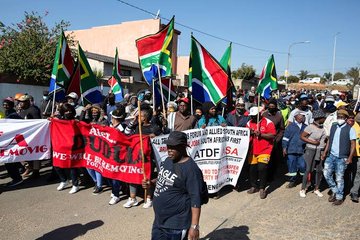Zimbabwe is going through economic and political turmoil. Inflation has been on the rise and poverty is increasing among the peasants and working class. However, things may get worse next year, 2023, when 180, 000 Zimbabweans will be deported just before watershed general elections.
Post-2000, millions of Zimbabweans have migrated to the United Kingdom, Australia or the United States but estimated millions have trooped to South Africa in search of greener pastures and safety.
Most of the economic refugees are neither highly skilled nor did they enter South Africa legally. In simple terms, they are undocumented immigrants.
However, things have become more complex. The economy in South Africa has not been performing at its peak and some jobs have been lost. Unemployment, particularly among those below 35 is on the rise. This has created tensions in poor communities in Gauteng and KwaZulu Natal provinces.
Post the 2007 Afrophobic attacks, the South African government decided to regularise Zimbabwean immigrants’ stay. The authorities came up with a specific document named Zimbabwe Exemption Permits (ZEP) that were targeting Zimbabwean illegal migrants. The permit allowed them to stay, get jobs, open bank accounts and seek medical help. A total of 180, 000 Zimbabweans benefitted. However, thousands more remained underground and are still undocumented.
In a turn of events, mainly influenced by domestic politics, South Africa at the beginning of 2022 announced that it was not renewing ZEP and holders had to seek other types of visas or go back home.
It is, however, unlikely that the illegal Zimbabweans will willingly come back. Even with para-military and vigilante groups like Dudula hunting them down, they have remained holed in South Africa.
The political stakes are high. The immigrants may just be lucky to gain a reprieve. In the past month, the Helen Suzman Foundation and Zimbabwean Immigration Federation have approached the Pretoria High Court saying the Home Affairs minister’s position on ZEP was irrational.
South African media Daily Maverick reported that: “HSF is taking the Minister of Home Affairs to court, seeking to set aside what it describes as a “hasty, untransparent and ill-considered” decision not to renew, beyond December of this year, the Zimbabwe Exemption Permit.”
HSF in its application argues that the ZEP was introduced in recognition of the dire situation in Zimbabwe and to alleviate pressure on the Department of Home Affairs in processing applications for asylum.
In a similar suit, Zimbabwe Immigration Federation director Vindiren Magadzire said: “Many of the 180, 000 Zimbabweans whose rights are implicated were forced to flee as a consequence of political violence, abductions, torture and economic factors. South Africa has been a safe haven for us. South Africa is bound, under international law, to avoid forcing any such person to return to their country.”
It is an established fact that ZEP was introduced in 2009. It allowed undocumented Zimbabweans to live, study and work legally in South Africa. Some have completed studies while some have started families and have children legally born in South Africa.
HSF executive director Nicole Fritz in her affidavit said the new policy will expose Zimbabwean immigrants to the dangers of xenophobic attacks, extortion, detention and deportation.
If the ZEP is withdrawn, thousands will lose their jobs, businesses and homes. They will also lose access to banking services and their children could be denied access to schooling, medical care and social services and they will be deported to Zimbabwe.
Most worryingly is that the Zimbabwe administration seems unfazed by the looming avalanche of deportations. It has no adequate houses or services to take care of the deportees.
On the other hand, the South African ruling party, ANC, is between a rock and a hard place as it lost its majority in local government elections last year. Political analysts argue that indications are that ANC for the first time since independence in 1994 will have less than 50% of the vote in the general elections scheduled for early 2024.
Immigration was an electoral issue during the local government elections, particularly in metropolitan cities. ANC is not ready to cede more ground to the opposition in the general elections and enter into a humiliating coalition arrangement.
It thus has no choice but to seem tough on illegal migration, crime and unemployment.
Operation Dudula, a private vigilante group with support from politicians will make or break the relations between Zimbabwe and South Africa. If Zimbabwe remains mute on the violence meted out on its citizens, it will mean these 180, 000 Zimbabweans could be on their own at the mercy of the vigilante groups.
For now, each government is concentrating on domestic issues but this will change soon if the xenophobic attacks emerge once again as surely as they would in the face of economic turmoil in South Africa. The poor are on their own and a fertile ground for resurgent nationalism.
Cover Photo: File/Masiza Sibanda



